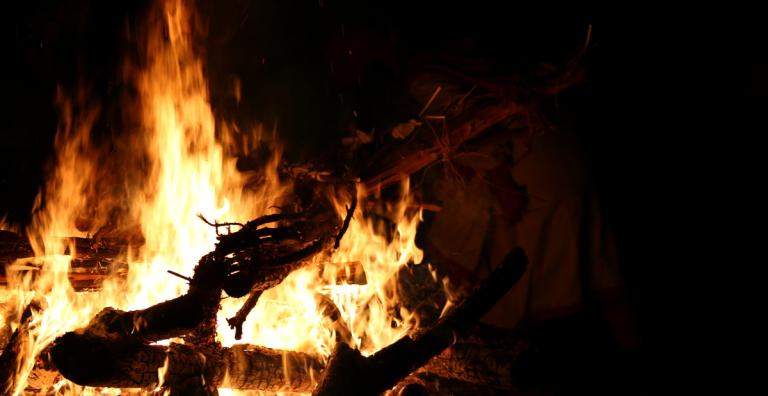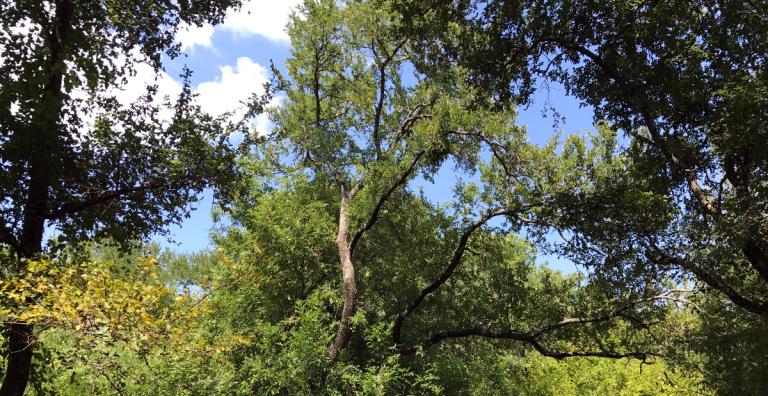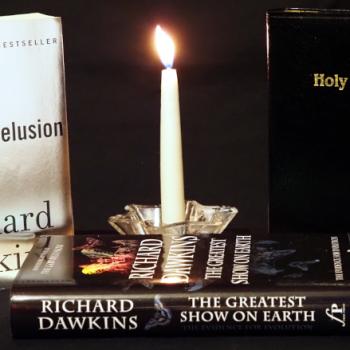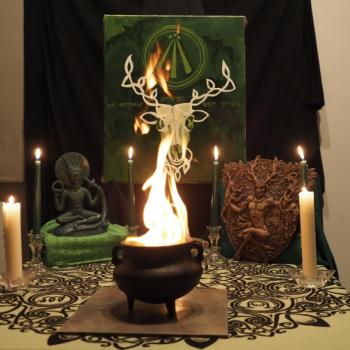The last post was about what to do when you hear the call of the Morrigan… or really, when you hear the call of any God. But that post has some unstated assumptions. Most notably, it assumes you recognize that what you’re hearing is 1) a God, 2) who is calling you, 3) into a relationship of devotion and service.
And like so many religious assumptions, that assumption is not necessarily true.
I mostly write about my own experiences. I grew up as a Christian, then I evolved into a vague deistic universalist. I became a Pagan, then also a Druid, then also a polytheist. This has been a life-long journey and it’s allowed plenty of time for me to comprehend the meaning of each step. Often, my writing unintentionally assumes everyone can follow my path and find polytheism inside the Big Tent of Paganism.
The Big Tent is a wonderful way to gradually find your path and your place. But not everyone is afforded the luxury of time.
What happens if you’re a 13-year-old girl who is forcefully claimed by Hecate? What happens if you’re a soldier in Afghanistan who – amongst the snipers and mortars and land mines – has a first-hand experience of the Morrigan? What happens if you’re an agnostic Nature-lover who runs face-first into Cernunnos in all his wild glory?
Scott Cunningham and Ronald Hutton aren’t going to be much help.
If this hits you out of the blue, you’re probably not going crazy
I’m a Druid and a priest, not a psychologist. If you need mental health care, I can’t help you – get mental health care. But it is very rare for people to go from mostly functioning in the ordinary world to schizophrenic in the time it takes for a God to pick you up and throw you across the room.
Irish author James Joyce once brought his daughter to see psychiatrist Carl Jung. Joyce didn’t understand how his daughter could have schizophrenia. He said “The way she thinks is the way I think, and I am not crazy.” Jung’s response was “You are swimming. She is drowning.”
Hearing a God and having mental health issues are not mutually exclusive. Sometimes it’s both. I have friends for whom it’s both – their lives are challenging, to say the least.
If you’re drowning, get mental health care. But if you were swimming yesterday and today you’re face-to-face with a demanding deity, you’re probably not going crazy. Rather, you’re having a religious experience for which both our mainstream culture and much of the Pagan movement has no context.
It’s the lack of context that makes you think you’re going crazy.
Your experiences are real
Go back over what happened – what did you perceive? What did you see, what did you hear, what did you feel, what did you smell, what did you taste? Your senses are not lying to you – you saw what you saw and you heard what you heard.
What thoughts popped into your head that aren’t yours? Unfamiliar words, phrases, and concepts… things you had no way of knowing… challenges to your ideas about what’s important in life…
Resist the urge to explain it away, or worse, to pretend it never happened. We can argue about how to interpret these experiences, but that they happened is an objective fact. Figuring out what they mean requires locating them within the context of other experiences, and within your ideas about the nature of the world and what is and isn’t possible.
And if you’re here reading this, odds are good you’re starting to seriously question what you’ve always been taught about what is and isn’t possible.
Our mainstream culture has no context for hearing a God
What happens when people who spend their whole lives in cities and suburbs are suddenly dropped in the wilderness? If it’s a planned “adventure” with local guides and plenty of provisions, it can be a fun and educational experience. But if it’s poorly planned, or especially if it’s an emergency (car trouble, plane crash, etc.) it’s stressful and scary and it may be fatal. People who’ve lived their whole lives in cities and suburbs have no context for living in the wild.
Our mainstream culture says there is one God who is distant and remote and who rarely interacts with people. The loudest religious alternative says there are no Gods. If you relate your experience to a typical Protestant minister, they will mostly likely attempt to explain it in psychological terms – because that’s all they know. Most Pagans will do the same, for the same reason.
All they can imagine is that either you have a psychological issue or you’re making it up. Their worldview doesn’t include Gods and spirits with sovereignty and agency.
That doesn’t mean such beings don’t exist.
Our ancient ancestors had context
Read the stories of the Greeks, Romans, and Norse. Read what the Egyptians quite literally carved in stone. Visit the remaining temples, burial chambers, and other sacred sites. While the Gods were often inscrutable, it was understood that they were very real and were perfectly capable of turning your life upside down.
Plutarch was wrong – Pan is not dead. The Gods of our ancestors may have faded into the background with the rise of monotheism, but for the past 300 years they’ve been becoming more and more active. Or perhaps it would be better to say that we’ve started noticing them again. Sometimes we can’t help but notice them.
Some cultures never lost contact with their Gods. Hindus argue amongst themselves about whether Hinduism is polytheist or monotheist. I’m not a Hindu, but I see the worship of many Gods, however you conceive of them. The African Traditional Religions have unbroken lineages that are thousands of years old, even though they’re under attack from Christianity, Islam, and atheism.
Context for the sudden first-hand experience of a God is available. We just have to dig a bit to find it.
The Big Tent is a lousy first responder
I love the Big Tent of Paganism. It gives people like me who cannot stay in the mainstream religions an easy way to find all sorts of religious options. It helps diverse groups of practitioners come together for things like Pantheacon and The Wild Hunt. It encourages dialogue between people who are trying to build and rebuild religious traditions.
But if you walk into the Big Tent with an urgent need for something that isn’t Wicca or Witchcraft, you may not find what you need in time. This goes double if the first person you run into preaches the attractive but unhelpful idea that “deep down it’s all the same” or “many paths, one mountain.” This is why I fought efforts to define polytheism in non-theistic terms and continue to do so when necessary. Differences matter.
If you’re suddenly hearing a God, you need more than generic Paganism.
Find a polytheist priest
Ideally, you will find a priest of the God who’s bothering you. That’s likely to be difficult, though. For one thing, you may not know exactly who you’ve encountered – many Gods aren’t big on identifying themselves at first contact. And even if you know who it is, it’s not like there’s a searchable directory of priests-by-deity on the internet.
But there are a few things any competent priest (or priestess – I use “priest” inclusively, for a variety of reasons) in any polytheist tradition should be able to do.
They can provide spiritual first aid: grounding and shielding, prayers and offerings. That will help you get back on your feet where you can start to process your experience.
They can provide context. The Greek mythology you learned in high school is a start, but it’s been filtered through centuries of Christian domination and decades of Hollywood exploitation. A polytheist priest can tell you how they experience the Gods and how they understand them not 2000 years ago, but here and now.
They can suggest resources. There are books that are helpful. Devotional practices are essential. And while they may not personally know a priest of the deity you’re experiencing, they probably know someone who does. Networking isn’t just a business thing.
They can help you figure out how to interpret your experiences. I’ve had people come to me crying “what does this mean?!” I can’t tell them – ultimately, you’re the only one who can decide what your experiences mean. But a competent priest can ask helpful questions and point you in the right direction.
As an aside: if you consider yourself a priest or priestess and you can’t do all these things, learn. And learn quickly. When someone calls you out of the blue begging for help, you don’t want to have to tell them “I’m sorry, I didn’t think I’d ever have a need for that skill.”
Respond to the call
In my experience, if a God is bothering you, it’s not to make your life miserable. Neither is it to fix your problems and raise you up to some higher level. Rather, it’s to call you into their service.
What does that service look like? Anything that promotes their virtues and values in this world is a possibility, from private devotion to priesthood to public service and a hundred different alternatives.
Whatever it is, it won’t make your life easier. Serving the Gods is work, and sometimes it’s hot, dirty, and difficult work.
But it will make your life deeper and more meaningful.
You must choose how to respond. I strongly recommend saying “yes.”
A call to my fellow polytheists
Our wider Pagan community has many resources for people who are gradually finding their way. For most of us, that’s exactly what we need. It was what I needed. But some people have traumatic experiences that make them wonder if they’re going crazy… and even if they’re sure they’re sane, they have no idea how to respond.
Our mainstream culture gives us no context for the sudden first-hand experience of a God. The Pagan community is only marginally better.
Those of us who are polytheists and especially those of us who are polytheist priests must be ready to respond. There is no one else who has the first-hand experience to tell people “no, you’re not going crazy. You’re hearing a God.”





















